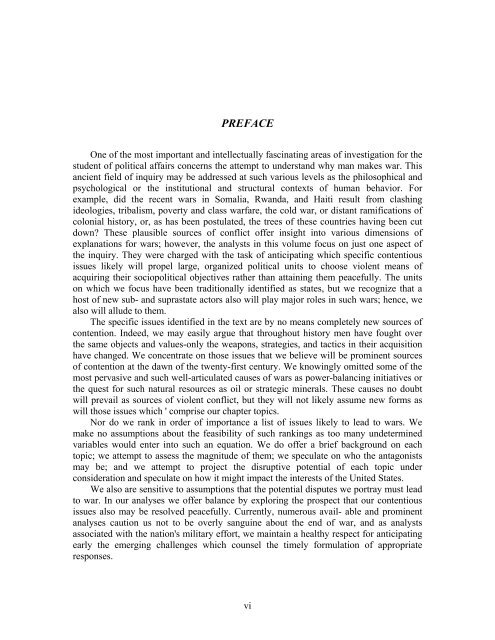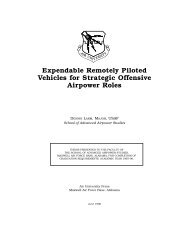Global Security Concerns - Project Gutenberg Consortia Center
Global Security Concerns - Project Gutenberg Consortia Center
Global Security Concerns - Project Gutenberg Consortia Center
You also want an ePaper? Increase the reach of your titles
YUMPU automatically turns print PDFs into web optimized ePapers that Google loves.
PREFACE<br />
One of the most important and intellectually fascinating areas of investigation for the<br />
student of political affairs concerns the attempt to understand why man makes war. This<br />
ancient field of inquiry may be addressed at such various levels as the philosophical and<br />
psychological or the institutional and structural contexts of human behavior. For<br />
example, did the recent wars in Somalia, Rwanda, and Haiti result from clashing<br />
ideologies, tribalism, poverty and class warfare, the cold war, or distant ramifications of<br />
colonial history, or, as has been postulated, the trees of these countries having been cut<br />
down? These plausible sources of conflict offer insight into various dimensions of<br />
explanations for wars; however, the analysts in this volume focus on just one aspect of<br />
the inquiry. They were charged with the task of anticipating which specific contentious<br />
issues likely will propel large, organized political units to choose violent means of<br />
acquiring their sociopolitical objectives rather than attaining them peacefully. The units<br />
on which we focus have been traditionally identified as states, but we recognize that a<br />
host of new sub- and suprastate actors also will play major roles in such wars; hence, we<br />
also will allude to them.<br />
The specific issues identified in the text are by no means completely new sources of<br />
contention. Indeed, we may easily argue that throughout history men have fought over<br />
the same objects and values-only the weapons, strategies, and tactics in their acquisition<br />
have changed. We concentrate on those issues that we believe will be prominent sources<br />
of contention at the dawn of the twenty-first century. We knowingly omitted some of the<br />
most pervasive and such well-articulated causes of wars as power-balancing initiatives or<br />
the quest for such natural resources as oil or strategic minerals. These causes no doubt<br />
will prevail as sources of violent conflict, but they will not likely assume new forms as<br />
will those issues which ' comprise our chapter topics.<br />
Nor do we rank in order of importance a list of issues likely to lead to wars. We<br />
make no assumptions about the feasibility of such rankings as too many undetermined<br />
variables would enter into such an equation. We do offer a brief background on each<br />
topic; we attempt to assess the magnitude of them; we speculate on who the antagonists<br />
may be; and we attempt to project the disruptive potential of each topic under<br />
consideration and speculate on how it might impact the interests of the United States.<br />
We also are sensitive to assumptions that the potential disputes we portray must lead<br />
to war. In our analyses we offer balance by exploring the prospect that our contentious<br />
issues also may be resolved peacefully. Currently, numerous avail- able and prominent<br />
analyses caution us not to be overly sanguine about the end of war, and as analysts<br />
associated with the nation's military effort, we maintain a healthy respect for anticipating<br />
early the emerging challenges which counsel the timely formulation of appropriate<br />
responses.<br />
vi






